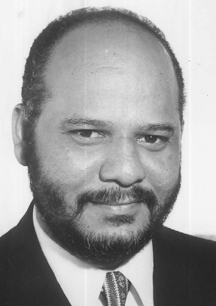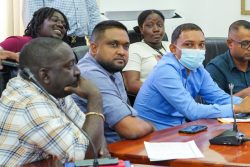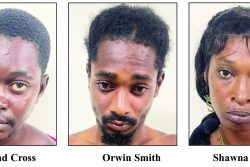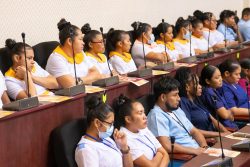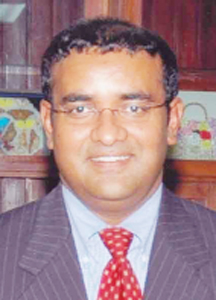 The Guyana Bar Association (GBA) has expressed alarm at recent statements made by President Bharrat Jagdeo and Home Affairs Minister Clement Rohee about the judiciary, some of which it said could be interpreted as threatening.
The Guyana Bar Association (GBA) has expressed alarm at recent statements made by President Bharrat Jagdeo and Home Affairs Minister Clement Rohee about the judiciary, some of which it said could be interpreted as threatening.
In a press release issued yesterday, the GBA referred to Jagdeo’s comment that “We have witnessed some element of judicial lawmaking and I hope that you will look into that to see that the judges and the magistrates abide with the laws of the country and the will of the legislature because we need a fair judiciary that is bound by the laws of the country, so we need to work on that.”
This was published in the April 29 edition of the Stabroek News, after the President said it while addressing the police officers conference at Eve Leary on April 24.
The GBA said the exhortation to look into and see that “the judges and the magistrates abide with the laws of the country” could be interpreted as a threat aimed at the judicial officers of this country, a notion that was improper and violated the Constitution.
“When the statement is further embellished with the words that ‘we need a fair judiciary that is bound by the laws of the country’ this suggests that the judiciary is not fair and is not bounded by the laws,” the GBA said.
With regard to Rohee, the GBA noted his statement in an article published in the Kaieteur News of May 22, in which he said he considered Chief Justice (ag) Ian Chang’s decision to grant bail to a murder accused to be a challenge to the government by the judiciary.
According to the press release, the minister’s further assertion that, “We now have bail applications being granted to murder accused.
The judiciary has now become totally unpredictable and case law is now thrown out the window”, was unfortunate, unjustified and implied that the minister was more au fait with case law than the courts or indeed the legal profession.
“Such an assertion and attack on the judges and the legal profession is unacceptable and the GBA is of the considered view that the judges and the legal profession should not be made scapegoats for the failure of the law enforcement agencies to do their job of intelligently investigating and prosecuting crimes,” the press release said.
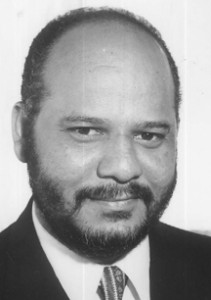 The Office of the President had immediately distanced itself from Rohee’s statements. However, the GBA noted that the President had previously made critical statements himself, which in the light of what Rohee had said, raised serious implications regarding policy.
The Office of the President had immediately distanced itself from Rohee’s statements. However, the GBA noted that the President had previously made critical statements himself, which in the light of what Rohee had said, raised serious implications regarding policy.
The GBA noted that the primary law of the country was the Constitution before which all other laws must be subordinate. It quoted Article 144 (2) (a) of the Constitution which says that a person is presumed innocent until he is proved guilty by a court of law or has pleaded guilty. “This means that neither the legislature nor the executive can direct the courts how to find a person on the trial of a matter, and therefore neither the legislature nor the executive should presume to tell the courts how they must determine matters. The freedom of an individual is still sacrosanct in our country, and the only guarantee of that freedom is the operation of independent Courts of Law staffed by independent judicial officers,” the GBA said.
It added that there had been many learned papers written about the object and application of bail, and all of them have in common that bail was not to be used as a punishment of an accused person before the court has found that person guilty. “In fact, the urging of members of the executive to deny bail when our Constitution provides that a person shall not be deprived of his personal liberty except in certain conditions (Article 139) is a form of intimidation that sets a dangerous precedent and should not be lightly trifled with.”
The GBA noted that bail was a judicial discretion that must be weighed by the judicial officer in accordance with the facts and circumstances of every case and administered according to principle and precedent. It is unreasonable to expect that the decision of the magistrate or judge will find universal approbation, but it must find universal respect as an inherently judicial process, the press release said.
The GBA said that as Guyanese we all need to understand and at the very least realize that the judicial system was staffed by human beings with flaws, but who must be presumed to be acting with professional integrity. To threaten the judiciary, it said, “is to shake the very foundations of our society and wake the beast of anarchy.
These statements can be interpreted as an attempt to intimidate persons who hold judicial office and make them fearful of deciding matters in a manner that the executive does not approve.”
The GBA urged that there be a more sober and tempered approach, which would avoid the recent utterances. What was needed instead, it said, was a commitment to revamp law enforcement systemically whilst working with the judiciary to achieve a common understanding for the good of the country and all of its citizens as a whole.
Eight years
Chief Justice Chang had granted bail to a Mahaica, East Coast Demerara man who had been in court for eight years waiting trial for two counts of murder. The motion to release the man, Hemchand Persaud, was filed by attorney-at-law, Sandil Kissoon.
Persaud and Rohan Singh had been charged with the April 2000 murder of James Sancharran and six-year-old Afraz Khan.
In his ruling, Justice Chang had noted that the delay in the man’s case was an error on the prosecution’s part and Persaud should not have been made to suffer for it. He pointed out that Article 139 of the Constitution provides for bail and extends such pre-trial liberties even to persons facing murder charges.
And following Rohee’s outburst, Justice Chang had responded that it ought to be viewed as a public reassurance that the judiciary was not the subservient mistress of the executive.
The next day, OP fired its salvo that, “Notwithstanding the minister’s concerns that are a reflection of social sentiment, the Office of the President wishes to advise that the executive is unprepared to accept any contention that such a ruling actually constitutes a challenge.”
Furthermore, the OP statement said, Cabinet at its meeting on May 13 discussed the issue of granting bail. It said Attorney General Doodnauth Singh was urged to continue evaluation of the implications of bail being granted for serious and frequently occurring crimes, bearing in mind that doing so could affect the stability of society by allowing for repeated offences by persons on bail or their escape from jurisdiction of the court.
According to Justice Chang, Article 153 provided him with the discretion to safeguard the fundamental rights of an accused and as such, he was granting the man bail.
However, Rohee told reporters on Wednesday that, on the one hand, while the executive authority was insisting on draconian penalties to support other measures in the context of a holistic approach to enhance public safety and security, the judiciary seemed unconvinced and was increasingly becoming more favourably disposed to upholding the fundamental rights of accused persons.
“But what about the fundamental rights of those who suffered and are traumatised for life?” Rohee had queried.
He had asked rhetorically whether he was to understand that if the gang members who committed the atrocities at Lusignan and Bartica were to be found, arrested, charged and taken before the courts, the magistrate or judge, under Articles 153 and 139 of the Constitution, would grant them bail to safeguard their constitutional rights.
Rohee had said that the interests of the public should also be taken into account in the dispensation of justice, adding that his understanding as a layperson was that the police considered the public interest when they arrested a person for a serious criminal offence.
Similarly, he said, the court was expected to do the same when considering bail applications. The minister had argued that the executive, for its part, considered the public interest when determining policy and legislation for passage in the Parliament.
“In other words, all should take public interest into account, particularly when it has to do with loss of property, life and limb as a result of the perpetration of a serious crime,” Rohee declared.
Justice Chang, in his statement, said that in a democratic state, the executive and the judiciary could not live cozily together as this was democratically unhealthy.
He added that some tension between the judiciary and executive was inevitable and must be accepted as normal, noting that it was meant to be so in the political structure of the state in which the doctrine of the separation of power inhered. “Such tension,” Justice Chang said, was a good sign of a democratically healthy state.
“It is the judiciary and not the executive which is the guardian of the Constitution,” Justice Chang declared.
